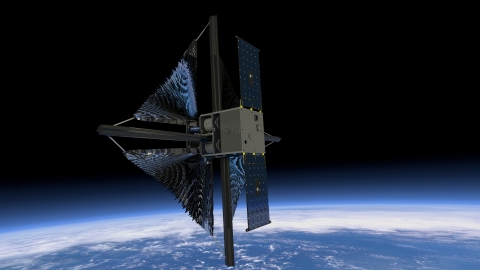Rocket Lab Selected to Launch NASA’s Advanced Composite Solar Sail System
Rocket Lab has been selected to launch NASA's Advanced Composite Solar Sail System (ACS3) using its Electron rocket. The mission aims to test new materials and technologies for solar sails, which utilize sunlight for propulsion, eliminating the need for traditional rocket fuel. Set to launch in mid-2022, the mission will employ Rocket Lab's Kick Stage for precise satellite deployment at higher altitudes. This collaboration reinforces Rocket Lab's role in innovative space technologies and supports future missions, including weather monitoring and near-Earth reconnaissance.
- Selected to launch NASA's ACS3 project, enhancing Rocket Lab's reputation.
- Innovative testing of solar sail technology could lead to future space exploration advancements.
- Demonstrated success of Kick Stage in previous launches supports mission reliability.
- Dependency on NASA for significant contracts may pose risks if future launches are delayed or canceled.
- Potential risks associated with the harsh environment of space could impact satellite performance.
Insights
Analyzing...
The Electron rocket will deploy an innovative satellite designed to test new deployable structures and materials technologies for solar sail propulsion systems, paving the way for sunlight to power future deep space exploration

NASA’s Advanced Composite Solar Sail System which will be launched by
NASA’s ACS3 technology demonstration uses composite materials - or a combination of materials with different properties, in its novel, lightweight booms that deploy from a CubeSat to support a solar sail. Just as a sailboat is powered by wind in a sail, solar sails employ the pressure of sunlight for propulsion, eliminating the need for conventional rocket propellant. Data obtained from the ACS3 demonstration will guide the design of future larger-scale composite solar sail systems that could be used for space weather early warning satellites, near-Earth asteroid reconnaissance missions, or communications relays for crewed exploration missions.
ACS3 will launch as part of a rideshare mission, scheduled for lift-off from
“We are thrilled to be NASA’s launch partner for this innovative mission,” said
-
NASA’s
Langley Research Center inHampton, Virginia is designing ACS3’s deployable composite booms and solar sail system. -
NanoAvionics of
Columbia, Illinois is designing and building the 12U CubeSat for the ACS3 technology demonstration. -
NASA’s
Ames Research Center in California’sSilicon Valley is managing the ACS3 project and will oversee final integration of the solar sail payload and CubeSat. -
The Santa Clara University’s
Robotics Systems Lab inSanta Clara, California will provide CubeSat operations support for the ACS3 technology demonstration. -
NASA’s Small Spacecraft Technology program within the agency’s
Space Technology Mission Directorate is sponsoring the ACS3 project and is providing the funding for the launch . -
NASA’s
Game Changing Development program within the agency’sSpace Technology Mission Directorate is developing ACS3’s deployable composite boom technology.
For more information about the ACS3 technology demonstration visit: www.nasa.gov/directorates/spacetech/small_spacecraft/ACS3
About
Founded in 2006,
Forward-Looking Statements
This press release may contain certain “forward-looking statements” within the meaning of the Private Securities Litigation Reform Act of 1995, Section 27A of the Securities Act of 1933, as amended, and Section 21E of the Securities and Exchange Act of 1934, as amended. These forward-looking statements, including without limitation expectations regarding the timing of scheduled launches, are based on Rocket Lab’s current expectations and beliefs concerning future developments and their potential effects. These forward-looking statements involve a number of risks, uncertainties (many of which are beyond Rocket Lab’s control), or other assumptions that may cause actual results or performance to be materially different from those expressed or implied by these forward-looking statements. Many factors could cause actual future events to differ materially from the forward-looking statements in this press release, including risks related to the global COVID-19 pandemic, including risks related to government restrictions and lock-downs in
which could adversely affect our launch vehicle and spacecraft; increased congestion from the proliferation of low Earth orbit constellations which could materially increase the risk of potential collision with space debris or another spacecraft and limit or impair our launch flexibility and/or access to our own orbital slots; increased competition in our industry due in part to rapid technological development and decreasing costs; technological change in our industry which we may not be able to keep up with or which may render our services uncompetitive; average selling price trends; failure of our satellites to operate as intended either due to our error in design in production or through no fault of our own; launch schedule disruptions; supply chain disruptions, product delays or failures; design and engineering flaws; launch failures; natural disasters and epidemics or pandemics; changes in governmental regulations including with respect to trade and export restrictions, or in the status of our regulatory approvals or applications; or other events that force us to cancel or reschedule launches, including customer contractual rescheduling and termination rights, and the other risks detailed from time to time in Rocket Lab’s filings with the
View source version on businesswire.com: https://www.businesswire.com/news/home/20211006005938/en/
+ Rocket Lab Media Contact
media@rocketlabusa.com
+64 27 538 9039
Source:






